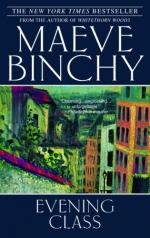|
This section contains 242 words (approx. 1 page at 300 words per page) |

|
Binchy's fiction is comic in the most classic sense of the word. Her foibled and flawed characters persist in spite of themselves. In this respect, her vision resembles the worlds William Shakespeare created in his comedies. Plays such as A Midsummer Night's Dream (c. 1596) and Much Ado About Nothing (c. 1598) end with the celebration of multiple pairings.
Plots complicated by mistaken identities and mix-ups end happily, but ambiguously. Myths, magic potions and other forms of deus ex machina are often necessary to resolve the plot. Both Shakespeare and Binchy leave the audience feeling that the ending is simply the beginning of another comedy of errors, and that comedy can become tragedy when no merciful deity descends to iron out plot difficulties.
In The Irish Comic Tradition (1962), literary scholar Vivian Mercier traces what he calls "the prevalence of the comic spirit in Anglo-Irish literature of the twentieth...
|
This section contains 242 words (approx. 1 page at 300 words per page) |

|




